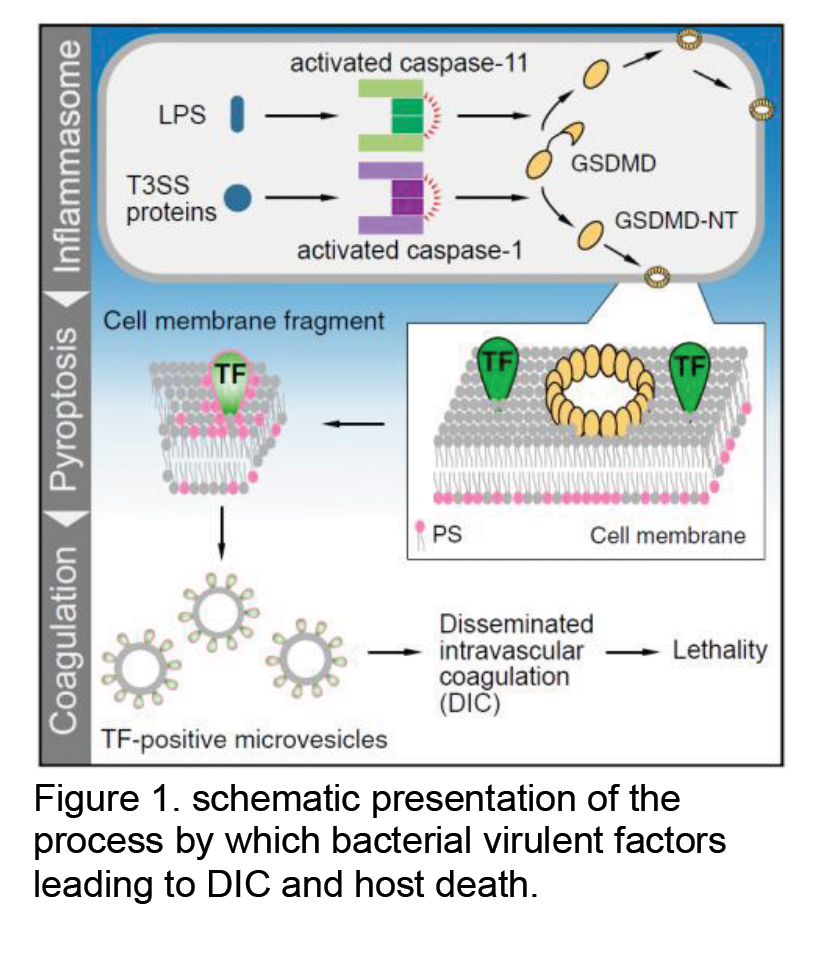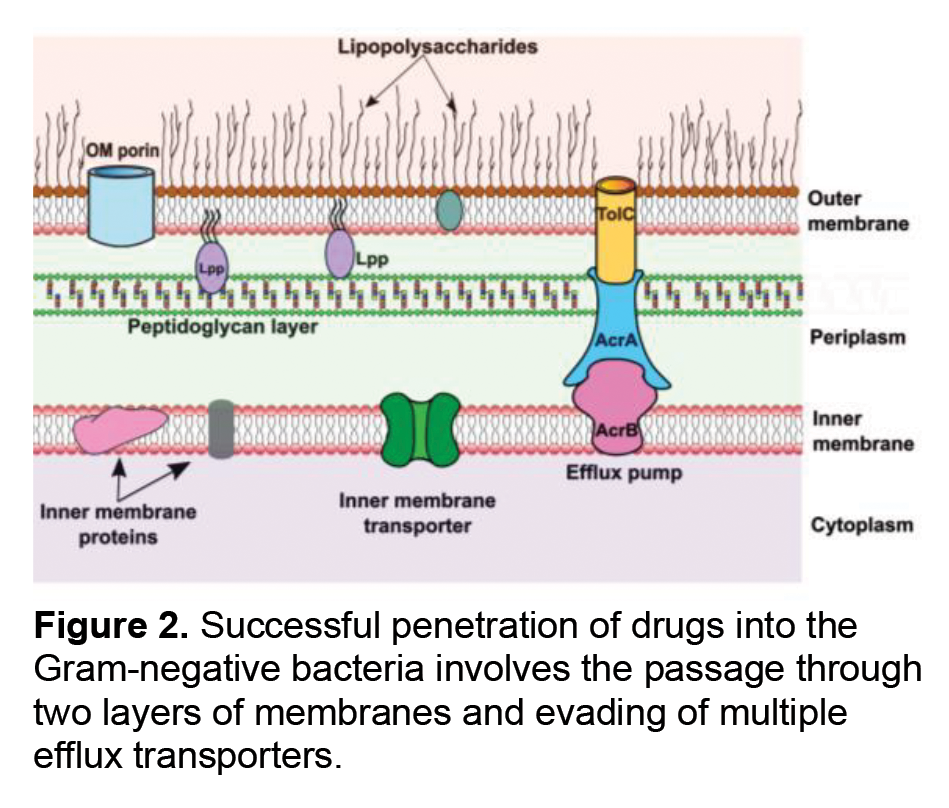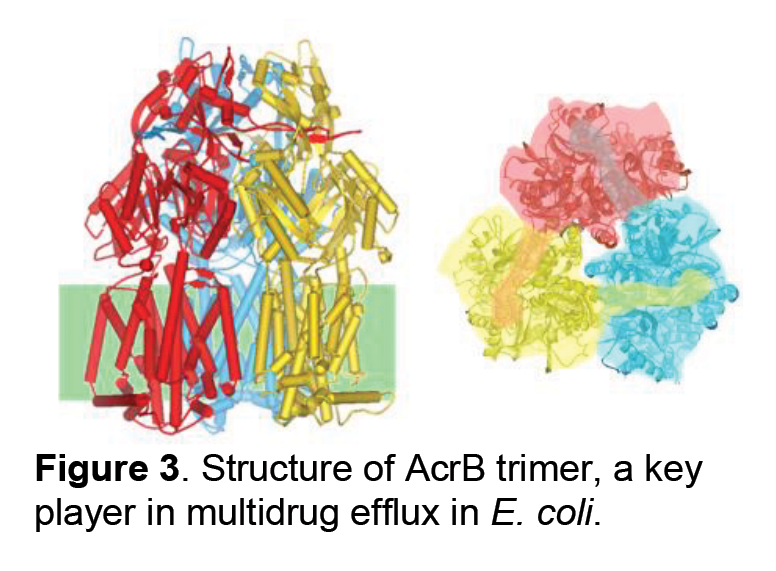Dr. Yinan Wei's Lab
Research Summary
The drive behind our research is to understand the interaction between bacterial pathogens with antimicrobials and with the host cells during infection. We are currently working on multiple projects on this front, ranging from the study of the mechanism of lethal infection, membrane protein biogenesis, to bacterial multidrug resistance.
Inflammasome activation and sepsis
Sepsis is a life-threatening condition that affects more than 1 million patients annually in the United States. While inflammasome activation and the subsequent cytokine storm are known to play a key role in the pathogenesis of sepsis, many missing links between the onset of the disease and the detrimental patient outcome including organ damage and death have hampered the development of effective treatment. In the past several years, we have teamed up with Dr. Zhenyu Li’s group to investigate the molecular mechanisms connecting the cellular events starting from the invasion of the microbes and detection by the host immune system, to the cascade of signaling pathways that lead to patient outcome.
 Probing the rule of penetration across the Gram-negative bacterial cell membrane
Probing the rule of penetration across the Gram-negative bacterial cell membrane
The World Health Organization has identified antimicrobial resistance as one of the top three threats to human health. Gram-negative bacteria are intrinsically more resistant to antimicrobials due to their impermeable membranes and efflux systems. There are very few drugs either on the market or in the pharmaceutical pipeline targeting Gram-negative pathogens, which make drug-resistance an even more severe issue in related infections. Our goal is to understand the principles and cellular components that collectively determine the permeability of small molecule compounds across the Gram-negative cell envelope.
 Understanding the mechanism of membrane protein complex formation and degradation
Understanding the mechanism of membrane protein complex formation and degradation
Life on earth began with the development of selective-permeable membranes, which define the boundaries of individual cells and cellular organelles, and are essential for energy production to sustain life. Membrane proteins are critical to many aspects of cellular processes. The majority of membrane proteins with known structures exist as oligomers. However, it is not yet clear how protein-protein interaction is established during oligomer assembly in cell membrane, especially for homo-oligomers containing more than two protomers. On another aspect, these interactions also influence the stability of degradation of membrane protein complex in response to cellular and environmental conditions. Understanding of molecular recognition processes in these events in cell membrane is essential to research in areas of protein evolution, function, and regulation. The goal of this project is to understand how proteins oligomerize and degrade in the cell membrane.
Lab Funding
-
“Inflammasome activation triggers systemic coagulation in sepsis” (MPI: Z. Li and Y. Wei) (NIH) ($2,285,308, 5/15/2019-4/30/2023)
-
“A novel mechanism of immunosuppression in sepsis: Depletion of monocytes and macrophages” (MPI: Z. Li and Y. Wei) (NIH) ($2,520,395, 9/1/2019-8/31/2023)
Publications Since 2019:
- Pendeya A., Li L., Li Z.*, Wei Y*. 2019. Gasdermin D (GSDMD) as a new target for the treatment of infection. MedChemComm, 10:660-667.
- Wu C., Lu W., Zhang Y., Zhang G., Shi X., Hisada Y., Grover S. P., Zhang X., Xiang B., Shi J., Li X., Daugherty A., Smyth S. S., Kirchhofer D., Shiroishi T., Shao F., Mackman N., Wei Y.*, and Zhenyu Li*. 2019. Inflammasome activation triggers blood clotting and host death through pyroptosis, Immunity, 50:1401-1411.
- Wagh P., Zhang X., Blood R., Kekenes-Huskey P. M., Rajapaksha P., Wei Y., Escobar I. C.*. Increasing salt rejection of polybenzimidazole nanofiltration membranes via the addition of immobilized and aligned aquaporins. Processes, 2019, 7, 76-99.
- Tu Y., Song W., Ren T. Shen Y., Chowdhury R., Rajapaksha P., Culp T. E., Samineni L., Lang C., Thokkadam A., Carson D., Dai Y., Mukthar A., Zhang M., Parshin A., Sloand J. N., Medina S. H., Grzelakowski M., Bhattacharya D., Phillip W. A., Gomez E. D., Hickey R. J., Wei Y. and Kumar M.* Rapid fabrication of precise high-throughput filters from membrane protein nanosheets. Nat. Mater. 2020, 19, 347–354.
- Rajapaksha P., Pandeya A., Wei Y.* Probing the dynamics of AcrB through disulfide bond formation. ACS Omega. 2020, 5: 21844-21852.
- Pandeya A., Ojo I., Alegun O., Wei Y.* Periplasmic targets for the development of effective antimicrobials against gram-negative bacteria. ACS Infect. Dis. 2020, 6, 9, 2337–2354.
- Pandeya A., Alegun O., Cai Y., Wei Y.* Distribution of Fluoroquinolones in the two aqueous compartments of Escherichia coli. Biochem. Biophys. Rep. 2020, 100849.
- Li Y., Lin X., Hu J., Shuai J., Wei Y., He D.* Synthesis and biological evaluation of stilbene-based peptoid mimics against the phytopathogenic bacterium Xanthomonas citri pv. Citri. Pest Manag Sci. 2021, 77(1):343-353.
- Yang L., Shi H., Zhang L., Lin X., Wei Y., Jiang H.*, Zeng Z.*, Emergence of two AcrB substitutions conferring multidrug resistance to Salmonella spp. Antimicrob Agents Chemother. 2021, 65(5):e01589-20.
- Zhang Y., Cui J. Zhang G., Wu C., Abdel-Latif A., Smyth S. S., Shiroishi T., Mackman N., Wei Y., Tao M., and Li Z.*, Inflammasome activation promotes venous thrombosis through pyroptosis. Blood Adv. 2021, 5(12): 2619–2623.
- Rajapaksha, P., Ojo, I.,Yang, L., Pandeya, A., Abeywansha, T., Wei, Y.*, Insight into the AcrAB-TolC Complex Assembly Process Learned from Competition Studies. Antibiotics 2021, 10, 830.
- Alegun, O., Pandeya, A., Cui, J., Ojo, I., Wei, Y.* Donnan Potential across the Outer Membrane of Gram-Negative Bacteria and Its Effect on the Permeability of Antibiotics. Antibiotics 2021, 10, 701.
- Pandeya A., Yang L., Alegun O, Karunasena C., Risko C., Li Z., Wei Y. * Biotinylation as a tool to enhance the uptake of small molecules in Gram-negative bacteria. PLoS ONE 2021, 16(11): e0260023. https://doi.org/10.1371/journal.pone.0260023
- Wei Y.*, Yang L., Pandeya A., Cui J., Zhang Y., Li Z.* Pyroptosis-Induced Inflammation and Tissue Damage. J Mol Biol. 2021 Oct 13;167301. doi: 10.1016/j.jmb.2021.167301. Online ahead of print.
- Yang L., Pandeya A., Li L., Ojo I., Li Z., Wei Y.* Transport Across Two Membrane Bilayers in E. coli by Efflux Pumps of Different Dimensions J Mol Biol. 2021 Nov 24;434(2):167376. doi: 10.1016/j.jmb.2021.167376. Online ahead of print.
Lab Members
 |
 |
|
Dr. Ling Yang Postdocteral Research Fellow
|
Ankit Pandeya Graduate Student |